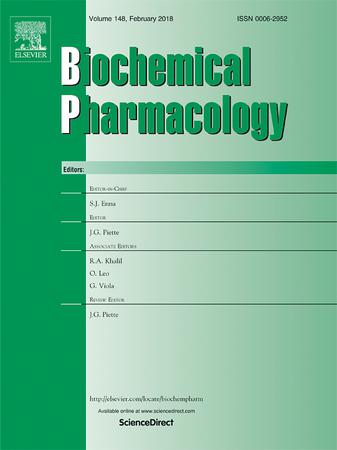Suppression of global protein synthesis and hepatocellular carcinoma cell growth by Benzimidazoisoquinoline, 4,11-Dichloro-BBQ
IF 5.6
2区 医学
Q1 PHARMACOLOGY & PHARMACY
引用次数: 0
Abstract
The aryl hydrocarbon receptor (AhR) is a ligand-activated transcription factor best known for mediating biological responses to a wide range of xenobiotics, such as dioxins and polycyclic aromatic hydrocarbons. Recently, AhR has emerged as an important player in cancer biology, with the potential for therapeutic applications through targeted modulation of its activity in specific cancer types. In this study, we report that 4,11-dichloro-BBQ (DiCl-BBQ), a benzimidazoisoquinoline, exhibits AhR-mediated antiproliferative activity in HepG2 hepatocellular carcinoma cells. DiCl-BBQ was found to decrease cell growth at nanomolar concentrations, and this antiproliferative effect persisted even after the compound’s removal. Using inducible shRNA expression system, we demonstrated that the inhibitory effect of DiCl-BBQ was significantly reduced following AhR knockdown. Flow cytometric analysis revealed that DiCl-BBQ halted cell division and induced G1 cell cycle arrest in an AhR-dependent manner. Proteomic profiling identified the top four enriched pathways following DiCl-BBQ exposure: metabolism of RNA, translation, ribonucleoprotein complex biogenesis, and carboxylic acid metabolic processes. Notably, DiCl-BBQ caused a dramatic downregulation of translation-associated proteins, with this response diminished in AhR-depleted cells. Consistently, global protein synthesis was significantly repressed in DiCl-BBQ-treated cells. Together, these results indicate that DiCl-BBQ effectively inhibits HepG2 cells growth by inducing G1 cell cycle arrest and downregulating the protein translation machinery in an AhR-dependent manner.

4,11-二氯苯并咪唑异喹啉对肝癌细胞生长和蛋白质合成的抑制作用。
芳基烃受体(AhR)是一种配体激活的转录因子,最著名的作用是介导生物对二恶英和多环芳烃等多种异生物的反应。最近,AhR 已成为癌症生物学中的一个重要角色,通过有针对性地调节其在特定癌症类型中的活性,AhR 有可能被应用于治疗。在这项研究中,我们报告了一种苯并咪唑异喹啉--4,11-二氯-BBQ(DiCl-BBQ)在 HepG2 肝癌细胞中表现出 AhR 介导的抗增殖活性。研究发现,在纳摩尔浓度下,DiCl-BBQ 能降低细胞的生长,甚至在去除该化合物后,这种抗增殖作用仍能持续。我们利用诱导性 shRNA 表达系统证明,AhR 被敲除后,DiCl-BBQ 的抑制作用明显减弱。流式细胞分析表明,DiCl-BBQ以AhR依赖的方式阻止细胞分裂并诱导G1细胞周期停滞。蛋白质组分析确定了暴露于DiCl-BBQ后前四种富集途径:RNA代谢、翻译、核糖核蛋白复合物生物生成和羧酸代谢过程。值得注意的是,DiCl-BBQ 导致翻译相关蛋白的急剧下调,这种反应在 AhR 贫化的细胞中有所减弱。同样,在经 DiCl-BBQ 处理的细胞中,全局蛋白质合成受到显著抑制。这些结果表明,DiCl-BBQ 通过诱导 G1 细胞周期停滞和以 AhR 依赖性方式下调蛋白质翻译机制,有效抑制了 HepG2 细胞的生长。
本文章由计算机程序翻译,如有差异,请以英文原文为准。
求助全文
约1分钟内获得全文
求助全文
来源期刊

Biochemical pharmacology
医学-药学
CiteScore
10.30
自引率
1.70%
发文量
420
审稿时长
17 days
期刊介绍:
Biochemical Pharmacology publishes original research findings, Commentaries and review articles related to the elucidation of cellular and tissue function(s) at the biochemical and molecular levels, the modification of cellular phenotype(s) by genetic, transcriptional/translational or drug/compound-induced modifications, as well as the pharmacodynamics and pharmacokinetics of xenobiotics and drugs, the latter including both small molecules and biologics.
The journal''s target audience includes scientists engaged in the identification and study of the mechanisms of action of xenobiotics, biologics and drugs and in the drug discovery and development process.
All areas of cellular biology and cellular, tissue/organ and whole animal pharmacology fall within the scope of the journal. Drug classes covered include anti-infectives, anti-inflammatory agents, chemotherapeutics, cardiovascular, endocrinological, immunological, metabolic, neurological and psychiatric drugs, as well as research on drug metabolism and kinetics. While medicinal chemistry is a topic of complimentary interest, manuscripts in this area must contain sufficient biological data to characterize pharmacologically the compounds reported. Submissions describing work focused predominately on chemical synthesis and molecular modeling will not be considered for review.
While particular emphasis is placed on reporting the results of molecular and biochemical studies, research involving the use of tissue and animal models of human pathophysiology and toxicology is of interest to the extent that it helps define drug mechanisms of action, safety and efficacy.
 求助内容:
求助内容: 应助结果提醒方式:
应助结果提醒方式:


